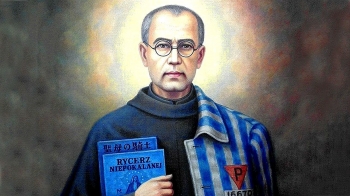
.jpg) F. M. Britto
F. M. Britto
.jpg)
One of the 600 prisoners had escaped from the Auschwitz camp on July 31, 1941. Since the fugitive was not captured within 24 hours, the Nazi’s deputy camp commander picked up ten men at random to be starved to death in his place.
The one among the ten, 41 years old Franciszek Gajowniczek screamed thinking of his family. Moved by his weeping, prisoner No. 16670 walked up to the commander SS-Hauptsturmfuhrer Karl Fritzsch and told him, “Sir, Let me take his place. He has a wife and children to live for.”
The stunned commander asked, “Who are you?”
“I am a Catholic priest,” responded the prisoner Maximilian Maria Kolbe.
“Granted,” he affirmed.
In the underground bunker, Father Kolbe comforted and led his companions in prayer. They were starved to death. Since only the 47 year old Kolbe survived for two weeks, they poked a lethal injection of carbolic acid in him and he died on Aug 14, 1941.
Kolbe was born as Raymond on Jan 8, 1894 to Julius and Maria in a small village Zdunska Wola in northern Poland, which was then under Russian empire. His weaver father was an ethnic German and his midwife mother, a Polish. The 13 years old Kolbe joined the Conventual Franciscans, along with his elder brother. As a Religious, he was given the name Maximilian and he, a devotee of Mary, adopted the additional name Maria. He earned doctorates in philosophy and Theology in Rome.
Ordained a priest in 1918, he returned to the independent Poland. Kolbe became active in strongly opposing the Communist movements. Though he suffered T.B, since 1936 he headed the Franciscans’ ‘City of the Immaculate’, which had the largest religious community in the world, comprising of 800 friars, specializing in various ministries. This township had a college, hospital, power plant, printing press and he established here a radio station.
During the World War II Germany captured Poland. Kolbe then sheltered here some 2000 Jewish refugees from Germans. He also issued many anti-Nazi bulletins.
Closing down the monastery on Feb 17, 1941, the Germans arrested Kolbe. He refused to sign a document that would recognize him as a German citizen, due to his paternal German ancestry and grant him German rights. Transferred to Auschwitz camp, Kolbe worked here with other prisoners. They harshly treated him until his death, since he acted as a Catholic priest.
When Pope Paul VI beatified Kolbe on Oct 17, 1971, thirty years after his sacrifice, the white-haired Gajowniczek, along with his wife, attended the beatification ceremony in Vatican, with tears in their eyes. Because of Kolbe’s self-sacrifice, the former Polish soldier could live with his wife, children and grandchildren till 93.
On Oct 10, 1982 Polish Pope John Paul II canonized Kolbe, declaring him a confessor and a martyr of charity. He has become the patron of prisoners, pro-life movement and journalists.
“Greater love has no man than this that a man lay down his life for his friends.” (Jn 15:13)